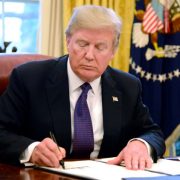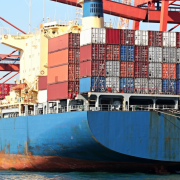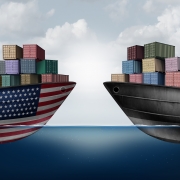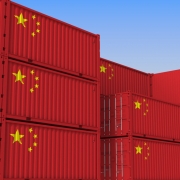Modern news cycles are filled with reporting about economic issues conflated with political issues. As political strategist James Carville boasted in 1992, “It’s the economy, stupid.” And the irony is rich. Almost all political commentary about economics is stupid. The current buzz surrounding trade deficits and tariffs is no exception.
Because the study of economics involves complexity, it helps to break down the political conversation into a few premises. And to do so, it makes sense to employ Bayesian logic. When analyzing uncertainty in complex systems, Thomas Bayes proved mathematically the value of integrating new information with existing data, and how to do it. Statistician Adrian Smith elaborates, “Any approach to scientific inference which seeks to legitimize an answer in response to complex uncertainty is, for me, a totalitarian parody of a would-be rational learning process.”
The Manufacturing Parody
For example, trade protectionists claim that manufacturing is the economic activity that determines a nation’s wealth. The corollary is that service industries merely redistribute this wealth. Of course manufacturing creates wealth by transforming its components into tangible products whose value is greater than the sum of its parts. But are service industries only window dressing?
Lets suppose that John Galt has invented a motor that runs on ambient static electricity. He has also come up with an efficient manufacturing process and eager customers to buy it. The demand for a reliable power generator that runs on an infinite source of free fuel is immense. The regulators are happy because the motor doesn’t pollute. All Mr. Galt needs is money and distribution. Without capital, his idea and prototypes are scrap.
His banker is Midas Mulligan; a service industry parasite if there ever was one. After all, his stock in trade cannot be consumed, and it can’t be used in the production of anything that can be consumed. Does his bank merely redistribute wealth, or do they repurpose it? In reality, aren’t wealth re-deployment and wealth creation co-dependent variables in an uncertain complex system?
The Service Industry Parody
Trade protectionists also conclude that it is impossible to grow a nations’ wealth with service industries. However, there is new data on wealth creation, and its called Gross Output. It was introduced by Professor Mark Skousen. He discovered that “measuring Gross Output is a breakthrough in national income accounting. For three quarters in a row in 2017, GO accelerated, probably due to the anticipated tax breaks and a deregulatory environment.” With Gross Output, the wealth created by the entire supply chain can now be measured.
And in the example of Mr. Galt’s motor manufacturing business, he needs a critical supply chain service – transportation. His customers are all over the country, and they want to install Galt’s motors in their power plants and machinery. Galt calls Dagny Taggart; she runs the most reliable railroad in the country. Ms. Taggart offers a price and Galt gladly accepts the competitive terms; without transportation his motors lose nearly all value. Is she exploiting Galt? Does she create wealth? Is she really just redistributing the wealth of others?
As finance journalist Larry Kudlow tell us, “When businesses produce profitably, they create income-producing jobs and thus consumers spend. Capital formation is the key to worker productivity and consumer prosperity.” The health of manufacturing and the service sector are not mutually exclusive, and many businesses have elements of both. In Bayes’ terms, they are co-dependent variables in an uncertain complex system.
The Fallacy of Deficits
Another illegitimate conclusion surrounds merchandise trade deficits. The claim is that they enrich foreign governments at the expense of the importer’s own citizens. But headline trade deficit numbers are missing a lot of important data. Economist Donald Boudreaux explains:
Despite the fetish that many people have for manufacturing, there’s nothing economically special about tangible goods and, hence, nothing meaningful about measurements of imports and exports of merchandise. The accounting rules that govern the computation of the capital and current accounts guarantee that, in economies with floating exchange rates, these two accounts cancel each other out.
This simply means that current account trade deficits have equal and offsetting capital account surpluses. Here Boudreaux uncovers the inconvenient truth about capital account surpluses:
The inflow of investment funds creates valuable assets, such as more machines, more factories, and increased research and development. This raises the productivity of labor (causing wages to rise), improves work conditions, and generates greater output. Americans’ standard of living increases.
Capital account surpluses are about the future; however political pressures require short-term thinking.
On Tariffs and the Wealth of Nations
Tariffs are sold as the monetary tool for righting trade imbalances, using your money. And the tariff experts also claim to be performing a public service. Supposedly tariffs reimburse the US Treasury for their foreign aid money dumps, repossessing the wealth looted by unfair trade practices. However, when foreign countries subsidize their exports, aren’t they really transferring wealth to our economy in the form of lower prices? If so, the savings will either be spent on other products, or saved and invested. In both cases this creates additional business, employment, and innovation.
Which brings us full circle. Powerful and wealthy nation-states have failed throughout history. But what was the true source of their wealth, and their demise? Trade hawks will say it’s manufacturing and trade deficits, respectively. But isn’t a nation’s wealth the individual wealth of its citizens, not their government? And isn’t human ingenuity the true source of all wealth, including plunder? Don’t free markets compound that wealth, not expert planning? At its core, the demise of those wealthy nations was the debasement of their currency, which destroyed markets. That is not a parody, it is the reality of complex systems being debased by illegitimate answers from incompetents with power. As economist Adam Smith observes in his masterpiece The Wealth of Nations, “Nothing, however, can be more absurd than this whole doctrine of the balance of trade.”













